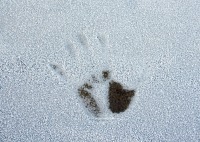 |
“The Nativity”
Lorenzo Lotto, 1523
National Gallery of Art
Washington D.C., USA |
Luke 2: 1-14 (KJV)
And it came to pass in those days, that there went out a decree from Caesar Augustus that all the world should be taxed. (And this taxing was first made when Cyrenius was governor of Syria.) And all went to be taxed, every one into his own city. And Joseph also went up from Galilee, out of the city of Nazareth, into Judaea, unto the city of David, which is called Bethlehem; (because he was of the house and lineage of David:) To be taxed with Mary his espoused wife, being great with child. And so it was, that, while they were there, the days were accomplished that she should be delivered.
And she brought forth her firstborn son, and wrapped him in swaddling clothes, and laid him in a manger; because there was no room for them in the inn. And there were in the same country shepherds abiding in the field, keeping watch over their flock by night. And, lo, the angel of the Lord came upon them, and the glory of the Lord shone round about them: and they were sore afraid. And the angel said unto them, Fear not: for, behold, I bring you good tidings of great joy, which shall be to all people. For unto you is born this day in the city of David a Saviour, which is Christ the Lord. And this shall be a sign unto you; Ye shall find the babe wrapped in swaddling clothes, lying in a manger.
And suddenly there was with the angel a multitude of the heavenly host praising God, and saying, Glory to God in the highest, and on earth peace, good will toward men.
Mary and Joseph have arrived. The crowds are almost too much to take, pushing and crushing as the couple makes their way through them. Mary doesn’t feel well. She really needs to just lie down and rest. And when you don’t feel well, the last place you want to be is somewhere that is not home, somewhere foreign, somewhere so crowded, so unwelcoming. They need to hurry. There is not too much time left.
They stop at a small inn up on the hill overlooking the shepherds’ pastures down below. Joseph leaves Mary for a moment and goes to make arrangements for a place to stay. But when he returns, his face looks frustrated, almost in tears. He tells Mary that the inn is full. In fact, the whole town is full. There is no place to stay. There is no room. But he tells Mary that the innkeeper has given them permission to at least go into the stableroom to keep warm. He’s freshening the hay now. Well, it will have to do.
You know, I think the innkeeper gets a bad wrap. I mean, was he supposed to kick someone else out? And consider this: This was not the Hilton. It probably wouldn’t even qualify as a roadside motel. It was probably just a couple of small beds in the innkeeper’s home. And first century houses were often just a room or maybe two of actual living quarters anyway. The second or third room was attached to the house and used to house the animals that were so much a part of their life. No one in this small town would have owned a large “ranch” estate. The stable probably wasn’t “out back” the way we think. It was part of the home. So the innkeeper was possibly, on some level, bringing Mary and Joseph, bringing strangers, into his home. What that means is that the Divine came into the world because someone acted human. Isn’t that amazing?
So Mary and Joseph entered the stableroom and, surrounded by animals, tried to get some rest. They could still hear the crowded city outside. They could hear the Roman guards yelling as they tried to control the crowds. It made the place feel every more foreign, even more foreboding. But directly overhead, was the brightest star they had ever seen. It was as if the tiny little stable was being bathed in light. So Mary laid down and closed her eyes. She knew that the time was almost here. She knew that the baby was coming into the world.
And on this night of nights, into a cold, dirty stable in a small town filled with yelling and pushing crowds, into a place occupied by soldiers, into a place that did not feel like home, into a world that had no room, God comes. The door to the Divine swings open and God and all of heaven burst into our little world, flooding it with Light and Life. And yet, the child in the manger bathed in light, the very Incarnation of the Divine, Emmanuel, God With Us, the Messiah, is, still, one of us. God takes the form of one of us–just an ordinary human–a human like you and me–to show us what it means to be one of us, to be human, to be made in the image of God.
God comes into a world that is unprepared for God, that has no room for God. God comes into places that are unclean, unworthy, unacceptable for us, much less for the Divine. God comes into places that most of us would not go, out of fear of the other, out of fear of the unknown, out of fear of the darkness. And there God makes a home. The Divine begins to pour into the world and with it a vision of the world pouring into the Divine. This night, though, is not the pinnacle of our lives but, rather, the beginning. God comes, bathed in Light, in the humblest of disguises immagineable, into the lowliest of places we know, into the darkest night of the soul, that we might finally know that all of the world is of God, all of the world is bathed in the Divine. God comes so that we might finally see life as we are called to see it and live life as we are called to live it, filled with mercy and compassion and awareness of our connectedness to all the world. God comes so that we might finally be human, so that we might finally make room.
Perhaps the world will never be completely ready for God. If God waited for us to be completely prepared, God would never come at all. But this God doesn’t need our preparation. This God doesn’t need to come into a place that is cleaned up and sanitized for God. Instead, God comes when and where God comes. God comes into godforsakenness, into a world that is occupied by foreignness, where the need for God is the greatest, into a world that cries out for justice and peace, and there God makes a home. God comes into the darkness and bathes it in light.
The time is almost here. In just a few hours the door to the Divine will swing open and God and all of heaven will burst into the world. If you stop and listen, just for a moment, you can hear the harps eternal in the distance as they approach our lives. Can’t you feel it? Doors opening, light flooding in, the earth filled with a new vision of hope and peace. Maybe, just maybe, tonight will be different. Maybe this is the night that the world chooses peace and justice and love. Maybe this is the night that the world takes joy. Maybe this is the night when the world realizes that it is already filled with the Divine. Maybe this is the night when we become human. Maybe this is the night that we make room.
O holy Child of Bethlehem, descend to us, we pray;
Cast out our sin, and enter in, be born in us today.
We hear the Christmas angels the great glad tidings tell;
O come to us, abide with us, our Lord Emmanuel!
(Phillips Brooks)
On this night of nights, give yourself the gift of making room for God. Give yourself the gift of being human. Give yourself the gift of making this night the beginning of God’s coming into the world.
Merry Christmas!
Shelli
![The Creation of Adam [Humanity], Michelangelo, segment of The Sistine Chapel, c. 1512](https://dancingtogod.files.wordpress.com/2013/03/creation_of_man_michelangelo.jpg?w=300&h=208)









